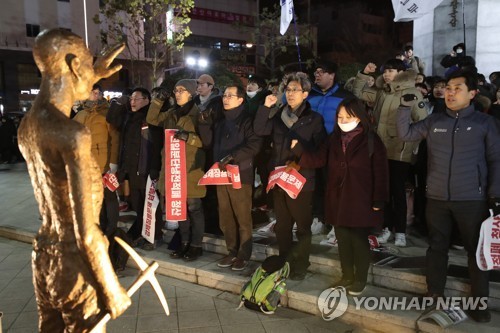Civic groups vow to erect statue for forced labor victims near Japanese consulate
By YonhapPublished : April 13, 2018 - 20:41
A coalition of South Korean civic groups vowed Friday to erect a statue in front of the Japanese Consulate in South Korea's second largest city of Busan next month to commemorate Korean victims of forced labor under Japan's colonial rule.

They rejected a proposal by the Busan municipal government to set it up at a substitute location.
The group, known as Busan Movement Headquarters for Social Reform and Elimination of Accumulated Ills, has pushed to install the statue on May 1 next to a statue of a girl symbolizing the victims of Japan's wartime sexual slavery, which was established by a South Korean civic group on Dec. 30, 2016.
Since last year, the coalition has received donations to install the sculpture depicting a gaunt Korean laborer, which have now reached 100 million won (US$94,300), more than the coalition's target of 80 million won.
During talks with representatives of the coalition in April, officials from Busan city government expressed their stance that the installation of the statue in front of the consulate could be illegal under a road law and proposed that it be installed at the state-run National Memorial Museum of Forced Mobilization under Japanese Occupation in the city.
The coalition said it will implement the installation as scheduled despite the city government's veiled objection to it, a development to irk the Japanese government that has called the civic group's move to install statues symbolizing Korean victims of forced labor near Japanese diplomatic missions a "big problem" and has, through diplomatic channels, called on Seoul to take action.
Japan ruled the Korean Peninsula from 1910 to 1945, a time during which historians say that millions of Koreans were coerced into labor. They also estimate that up to 200,000 women, mostly from Korea, were forced to work in front-line brothels for Japanese troops during World War II.(Yonhap)








![[Graphic News] More Koreans say they plan long-distance trips this year](http://res.heraldm.com/phpwas/restmb_idxmake.php?idx=644&simg=/content/image/2024/04/17/20240417050828_0.gif&u=)
![[KH Explains] Hyundai's full hybrid edge to pay off amid slow transition to pure EVs](http://res.heraldm.com/phpwas/restmb_idxmake.php?idx=644&simg=/content/image/2024/04/18/20240418050645_0.jpg&u=20240419100350)






![[From the Scene] Monks, Buddhists hail return of remains of Buddhas](http://res.heraldm.com/phpwas/restmb_idxmake.php?idx=652&simg=/content/image/2024/04/19/20240419050617_0.jpg&u=20240419175937)

![[KH Explains] Hyundai's full hybrid edge to pay off amid slow transition to pure EVs](http://res.heraldm.com/phpwas/restmb_idxmake.php?idx=652&simg=/content/image/2024/04/18/20240418050645_0.jpg&u=20240419100350)

![[Today’s K-pop] Illit drops debut single remix](http://res.heraldm.com/phpwas/restmb_idxmake.php?idx=642&simg=/content/image/2024/04/19/20240419050612_0.jpg&u=)